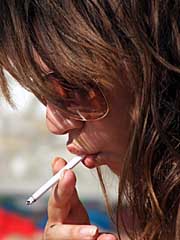The National Cancer Institute (NCI)* states that the lower tar and nicotine numbers advertised by light cigarette manufacturers are misleading and false. They go on to state that "Light cigarettes trick the smoking machines to report artificially low tar and nicotine levels." In addition, the site goes on to state that light cigarettes provide virtually no health benefits over the typical "regular" cigarette.
 The NCI states that a major factor in light cigarettes' lower tar and nicotine numbers are tiny vent holes built into the filter of the cigarette. On testing machines, these vents are unobstructed, whereas the NCI states that in regular use, most if not all of these vents are obstructed by the smoker's lips, thus creating a "regular" cigarette.
The NCI states that a major factor in light cigarettes' lower tar and nicotine numbers are tiny vent holes built into the filter of the cigarette. On testing machines, these vents are unobstructed, whereas the NCI states that in regular use, most if not all of these vents are obstructed by the smoker's lips, thus creating a "regular" cigarette.
Many consumers and consumer advocates are of the opinion that the cigarette companies have advertised "light cigarettes as a safer alternative to regular filtered cigarettes" and some allege that this is outright misrepresentation and detrimental to the health of the consumer. This includes the NCI itself.
The NCI published a detailed monograph on the light cigarette matter in 2001, where a variety of issues pertaining to public misconceptions about the relative safety of light cigarettes were outlined. One chapter in particular clearly states that the public does not understand the true meaning of terms like "ultra-light" and "light" and naturally assumes these terms imply a number of benefits for the smoker, not the least of which is less tar and nicotine in light cigarettes than regular filter cigarettes. More importantly, it points out that most people surveyed thought that these terms implied a lower risk of cancer, which according to the report is actually statistically negligible.
 Yet the industry continues to imply in its advertising and branding that light cigarettes are substantially less risky, or "healthier" than the typical popular brand filtered cigarette when this is allegedly based on false information. This is stated by an agency of the US federal government itself. If you smoke or smoked light cigarettes believing that they were safer than regular filtered cigarettes, you may have been the victim of misrepresentation or consumer fraud.
Yet the industry continues to imply in its advertising and branding that light cigarettes are substantially less risky, or "healthier" than the typical popular brand filtered cigarette when this is allegedly based on false information. This is stated by an agency of the US federal government itself. If you smoke or smoked light cigarettes believing that they were safer than regular filtered cigarettes, you may have been the victim of misrepresentation or consumer fraud.
* The National Cancer Institute (NCI) is a component of the National Institutes of Health (NIH), one of eight agencies that compose the Public Health Service (PHS) in the Department of Health and Human Services (DHHS). The NCI, established under the National Cancer Act of 1937, is the Federal Government's principal agency for cancer research and training. The National Cancer Act of 1971 broadened the scope and responsibilities of the NCI and created the National Cancer Program.
Light Cigarettes in the News
Oct-16-06: Big tobacco asks court to reverse decision to grant class action status to 'light' cigarette lawsuit. [BUSINESS JOURNAL: LIGHT CIGARETTES]Sep-25-06: Judge grants class action suit on 'light' cigarettes. [




